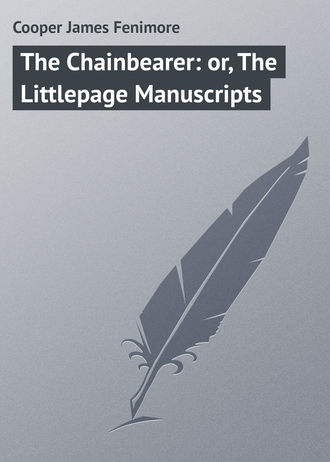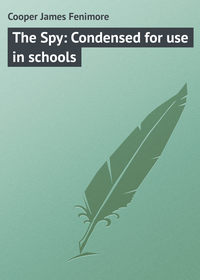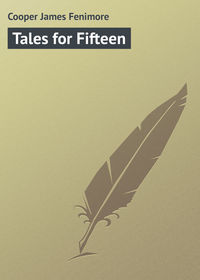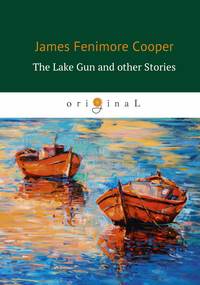 полная версия
полная версияThe Chainbearer: or, The Littlepage Manuscripts
"That is quite forgotten, and my mother says it all arose from a mistake. We are decided friends now."
"I'm sure I am very glad to hear it; for, since it is peace, let us have peace; though old enemies are not apt to make very decided friends."
"But we never were – that is, my grandfather never was an enemy of anybody; and the whole matter was amicably settled just before he went to Europe, on his unfortunate visit to Sir Harry Bulstrode. No – no – my mother will tell you, Mordaunt, that the Littlepages and the Bayards now regard each other as very decided friends."
Kate spoke with so much earnestness that I was disposed to take a look at her. The face of the girl was flushed, and I fancy she had a secret consciousness of the fact; for she turned it from me as if gazing at some object in the opposite direction, thereby preventing me from seeing much of it.
"I am very glad to learn all this," I answered, a little dryly. "As I am a Littlepage, it would have been awkward not to have known it, had I accidentally met with one of these Bayards. Does the peace include all of the name, or only those of the Hickories?"
Kate laughed; then she was pleased to tell me that I was to consider myself the friend of all of the name.
"And most especially of those of the name who dwell at the Hickories?"
"How many may there be of this especially peaceful breed? six, a dozen, or twenty?"
"Only four; so your task will make no very heavy demand on your affections. Your heart has room, I trust, for four more friends?"
"For a thousand, if I can find them, my dear. I can accept as many friends as you please, but have places for none else. All the other niches are occupied."
"Occupied! – I hope that is not true, Mordaunt. One place, at least, is vacant."
"True; I had forgotten a place must be reserved for the brother you will one day give me. Well, name him, as soon as you please; I shall be ready to love him, child."
"I may never make so heavy a draft on your affections. Anneke has given you a brother already, and a very excellent one he is, and that ought to satisfy a reasonable man."
"Ay, so all you young women say between fifteen and twenty, but you usually change your mind in the end. The sooner you tell me who the youth is, therefore, the sooner I shall begin to like him – is he one of the Bayards? —un chevalier sans peur et sans reproche?"
Kate had a brilliant complexion, in common; but, as I now turned my eyes toward her inquiringly, more in mischief, however, than with the expectation of learning anything new, I saw the roses of her cheeks expand until they covered her temples. The little beaver she wore, and which became her amazingly, did not suffice to conceal these blushes, and I now really began to suspect I had hit on a vein that was sensitive. But my sister was a girl of spirit, and though it was no difficult thing to make her change color, it was by no means easy to look her down.
"I trust your new brother, Mordaunt, should there ever be such a person, will be a respectable man, if not absolutely without reproach," she answered. "But, if there be a Tom Bayard, there is also a Pris Bayard, his sister."
"So – so – this is all news to me, indeed! As to Mr. Thomas Bayard, I shall ask no questions, my interest in him, if there is to be any, being altogether ex officio, as one may say, and coming as a matter of course; but you will excuse me if I am a little curious on the subject of Miss Priscilla Bayard, a lady, you will remember, I never saw."
My eye was on Kate the whole time, and I fancied she looked gratified, though she still looked confused.
"Ask what you will, brother – Priscilla Bayard can bear a very close examination."
"In the first place, then, did that old gossip allude to Miss Priscilla, by saying there would be light hearts and happy ones among the Bayards?"
"Nay, I cannot answer for poor Mrs. Light's conceits. Put your questions in some other form."
"Is there much intimacy between the people of the 'Bush and those of the Hickories?"
"Great —we like them exceedingly; and I think they like us."
"Does this intimacy extend to the young folk, or is it confined to the old?"
"That is somewhat personal," said Kate, laughing, "as I happen to be the only 'young folk' at the 'Bush, to maintain the said intimacy. As there is nothing to be ashamed of, however, but, on the contrary, much of which one may be proud, I shall answer that it includes 'all ages and both sexes;' everybody but yourself, in a word."
"And you like old Mr. Bayard?"
"Amazingly."
"And old Mrs. Bayard?"
"She is a very agreeable person, and an excellent wife and mother."
"And you love Pris Bayard?"
"As the apple of mine eye," the girl answered with emphasis.
"And you like Tom Bayard, her brother?"
"As much as is decent and proper for one young woman to like the brother of another young woman, whom she admits that she loves as the apple of her eye."
Although it was not easy, at least not easy for me, to cause Kate Littlepage to hold her tongue, it was not easy for her to cause the tell-tale blood always to remain stationary. She was surprisingly beautiful in her blushes, and as much like what I had often fancied my dear mother might have been in her best days as possible, at the very moment she was making these replies as steadily as if they gave her no trouble.
"How is all this then, connected with rejoicings among the people of the Hickories, at my return? Are you the betrothed of Tom Bayard, and have you been waiting for my return to give him your hand?"
"I am not the betrothed of Tom Bayard, and have not been waiting for your return to give him my hand," answered Kate, steadily. "As for Mrs. Light's gossipings, you cannot expect me to explain them. She gets her reports from servants, and others of that class, and you know what such reports are usually worth. But, as for my waiting for your return, brother, in order to announce such an event, you little know how much I love you, if you suppose I would do any such thing."
Kate said this with feeling, and I thanked her with my eyes, but could not have spoken, and did not speak, until we had ridden some distance. After this pause, I renewed the discourse with some of its original spirit.
"On that subject, Katrinke, dear," I said, "I trust we understand each other. Single or married, you will ever be very dear to me; and I own I should be hurt to be one of the last to learn your engagement, whenever that may happen. And now for this Priscilla Bayard – do you expect me to like her?"
"Do I! It would be one of the happiest moments of my life, Mordaunt, when I could hear you acknowledge that you love her!"
This was uttered with great animation, and in a way to show that my sister was very much in earnest. I felt some surprise when I put this feeling in connection with the landlady's remarks, and began to suspect there might be something behind the curtain worthy of my knowledge. In order to make discoveries, however, it was necessary to pursue the discourse.
"Of what age is Miss Bayard?" I demanded.
"She is two months my senior – very suitable, is it not?"
"I do not object to the difference, which will do very well. Is she accomplished?"
"Not very. You know few of us girls who have been educated during the revolution, can boast of much in that way; though Priscilla is better than common."
"Than of her class, you mean, of course?"
"Certainly – better than most young ladies of our best families."
"Is she amiable?"
"As Anneke, herself!"
This was saying a great deal, our eldest sister, as often happens in families, being its paragon in the way of all the virtues, and Anneke's temper being really serenity itself.
"You give her a high character, and one few girls could sustain. Is she sensible and well-informed?"
"Enough so as often to make me feel ashamed of myself. She has an excellent mother, Mordaunt; and I have heard you say, often, that the mother would have great influence with you in choosing a wife."
"That must have been when I was very young, child, before I went to the army, where we look more at the young than at the old women. But, why a wife? Is it all settled between the old people, that I am to propose to this Priscilla Bayard, and are you a party to the scheme?"
Kate laughed with all her heart, but I fancied she looked conscious.
"You make no answer, young lady, and you must permit me to remind you that there is an express compact between you and me to treat each other frankly on all occasions. This is one on which I especially desire to see the conditions of the treaty rigidly enforced. Does any such project exist?"
"Not as a project, discussed and planned – no – certainly not. No, a thousand times, no. But I shall run the risk of frustrating one of my most cherished hopes, by saying, honestly, that you could not gratify my dear mother, aunt Mary, and myself, more than by falling in love with Pris Bayard. We all love her ourselves, and we wish you to be of the party, knowing that your love would probably lead to a connection we should all like, more than I can express. There; you cannot complain of a want of frankness, for I have heard it said, again and again, that the wishes of friends, indiscreetly expressed, are very apt to set young men against the very person it is desired to make them admire."
"Quite likely to be true as a rule, though in my case no effect, good or bad, will be produced. But how do the Bayards feel in this matter?"
"How should I know! Of course, no allusion has ever been made to any of the family on the subject; and, as none of them know you, it is im – that is, no allusion – I mean – certainly not to more than one of them. I believe some vague remarks may have been ventured to one – but – "
"By yourself, and to your friend Pris?"
"Never" – said Kate, with emphasis. "Such a subject could never be mentioned between us."
"Then it must have been between the old ladies – the two mothers, probably?"
"I should think not. Mrs. Bayard is a woman of reserve, and mamma has an extreme sense of propriety, as you know yourself, that would not be likely to permit such a thing."
"Would the general think of contracting me, when my back was turned?"
"Not he – papa troubles himself very little about such things. Ever since his return home, he has been courting mamma over again, he tells us."
"Surely, aunt Mary has not found words for such an allusion!"
"She, indeed! Poor, dear aunt Mary; it is little she meddles with any one's concerns but her own. Do you know, Mordaunt, that mamma has told me the whole of her story lately, and the reason why she has refused so many excellent offers. I dare say, if you ask her, she will tell you."
"I know the whole story already, from the general, child. But, if this matter has been alluded to, to one of the Bayards, and neither my father, mother, nor aunt Mary, has made the allusion on our side, and neither Mr. Bayard, his wife, nor daughter, has been the party to whom the allusion has been made on the other, there remain only yourself and Tom to hold the discourse. I beg you to explain this point with your customary frankness."
Kate Littlepage's face was scarlet. She was fairly caught, though I distrusted the truth from the moment she so stammered and hesitated in correcting her first statement. I will own I enjoyed the girl's confusion, it made her appear so supremely lovely; and I was almost as proud of her, as I tenderly loved her. Dear, dear Kate; from my childhood I had my own amusement with her, though I do not remember anything like a harsh expression, or an unkind feeling, that has ever passed, or indeed existed, between us. A finer study than the face of my sister offered for the next minute, was never presented to the eye of man; and I enjoyed it so much the more, from a strong conviction that, while so deeply confused, she was not unhappy. Native ingenuousness, maiden modesty, her habit of frank dealing with me, and a wish to continue so to deal, were all struggling together in her fine countenance, forming altogether one of the most winning pictures of womanly feelings I had ever witnessed. At length, the love of fair-dealing, and love of me, prevailed over a factitious shame; the color settled back to those cheeks whence it had appeared to flash, as it might be, remaining just enough heightened to be remarked, and Kate looked toward me in a way that denoted all the sisterly confidence and regard that she actually felt.
"I did not intend to be the one to communicate to you a fact, Mordaunt, in which I know you will feel a deep interest, for I had supposed my mother would save me the confusion of telling it to you; but, now, there is no choice between resorting to equivocations that I do not like, and using our old long-established frankness."
"The long and short of which, my dear sister, is to say that you are engaged to Mr. Bayard?"
"No; not as strong as that, brother. Mr. Bayard has offered, and my answer is deferred until you have met him. I would not engage myself, Mordaunt, until you approved of my choice."
"I feel the compliment, Katrinke, and will be certain to repay it, in kind. Depend on it, you shall know, in proper season, when it is my wish to marry, and shall be heard."
"There is a difference between the claims of an elder and an only brother, and of a mere girl, who ought to place much dependence on the advice of friends, in making her own selection."
"You will not be a 'mere girl' when that time comes, but a married woman yourself, and competent to give good counsel from your own experience. To return to Tom, however; he is the member of his family to whom the allusion was made?"
"He was, Mordaunt," answered Kate, in a low voice.
"And you were the person who made it?"
"Very true – we were talking of you, one day; and I expressed a strong hope that you would see Priscilla with the eyes with which, I can assure you, all the rest of your family see her. That was all."
"And that was quite enough, child, to cause Tom Bayard to hang himself, if he were a lover of the true temper."
"Hang himself, brother! I am sure I do not understand why?"
"Oh! merely at the palpable discouragement such a wish would naturally convey to the brother of the young lady, since he must have seen you were willing to connect the two families by means other than giving him your own hand."
Kate laughed; but as she did not look much confused, or at all alarmed, I was induced to believe that more important encouragement than could be afforded by means of her wish of marrying me to her suitor's sister had been given Master Tom, and that my disapproval of the gentleman would cause her more concern than she chose to avow. We rode on, however, some little distance, without either's offering to renew the discourse. At length, as became my sex, I spoke.
"When am I to see this paragon young man and paragon young woman, Kate, since see both I must?"
"Not paragon young man, brother; I am certain I have called him by no such name; Tom Bayard is a good fellow; but I do not know that he is by any means a paragon."
"He is a good-looking fellow in the bargain, I take it for granted?"
"Not so much so as you are yourself, if that will gratify your vanity."
"It ought to, coming from such a quarter; my question is still unanswered, notwithstanding."
"To own the truth to you, Mordaunt, I expect we shall find Tom Bayard and Pris at Satanstoe, to dine with my grandmother. She wrote me word, a day or two since, that both are asked, and that she hoped both would accept."
"The old lady is then in the plot, and intends to marry me, will ye, nill ye? I had thought this visit altogether a scheme of my own."
Kate again laughed, and told me I might make my own observations on that point, and judge for myself. As for the visit, I had only accidentally favored a project of others. The conversation now changed, and for several miles we rode along, conversing of the scenes of the war, without adverting to the Bayards or to marriages.
We were within half a mile of the gate of the Neck, and within a mile of the house, when we met Jaap returning to Lilacsbush, and carrying some fruit to my mother, after having discharged his commission of an avant-courier. From Kate's remark I had discovered we had been invited by letter to take this excursion, though the ceremony of sending the negro across with his message had been observed for reasons that were not very natural under the circumstances. I made no remark, however, determining to see and judge for myself.
As a matter of course, we drew our reins, and stopped to exchange a few words with the black.
"Well, Jaap, how did the Neck look, after so long an absence?" I inquired.
"It look, sah, no means as well as ole Missus, who do look capital, for such a lady! Dey do won'ers with 'e Neck, sah, if you just believe all young nigger say. But what you t'ink, Masser Mordy, I hear at 'e tavern, where I jist stop, sah, to water ole Dick?"
"And to get a sup of cider for old Jaap" – hereupon the negro laughed heartily, though he had the impudence neither to own nor to deny the imputation, his weakness in favor of "wring-jaw" being a well-established failing – "Well, what did you hear, while taking down the usual mug?"
"I on'y get half a mug, dis time, sah; ole, ole Missus nebber forgettin' to give me jist as much as I want. Well, sah, while old Dick drink, 'e new landlady, who come from Connetick, you know, sah, she say to me, 'Where you go, ole color' gentleum?' Dat war' civil, anyhow."
"To which you answered – "
"I answer her, sah, and say I go to Satanstoe, whar' I come from, long time 'go."
"Whereupon she made some observation or other – well, what was it? – You keep Miss Littlepage waiting."
"Lor' bless her, sah – it my business to wait on Miss Katrinke, not her business to wait on me– why you speak so droll, now, Masser Mordy?"
"Never mind all that, Jaap, what did the new Connecticut lady say, when you told her you were going to Satanstoe, the place where you had come from, a long time ago?"
"What she say, Masser Mordy, sah! – she say great foolishness, and make me mad. 'What you call by dat awful name?' she say, making face like as if she see a spook. 'You must mean Dibbleton,' she say – 'dat 'e way all 'e people as is genteel call 'e Neck?' Did you ebber hear 'e like, sah?"
"Oh! yes; I heard the like of it, as soon as I was born; the attempt to change the name of our old place having existed now, these thirty years. Why, some people call Hellgate, Hurlgate; after that, one may expect anything. Do you not know, Jaap, a Yankee is never satisfied, unless he is effecting changes? One half his time he is altering the pronunciation of his own names, and the other half he is altering ours. Let him call the place what he will, you and I will stick to Satanstoe."
"Dat we will, sah – gib 'e debbil his due, sah; dat an ole sayin'. I'm sure anybody as has eyes, can see where his toe hab turn up 'e sile, and shape it he own way – no dibble dere, sah."
Thus saying, Jaap rode on, my sister and myself doing the same, pursuing the discourse that had thus accidentally arisen among us.
"Is it not odd, brother, that strangers should have this itching to alter the name of my grandmother's place?" said Kate, after we had parted from the black. "It is a homely name, certainly; but it has been used, now, a good deal more than a century, and time, at least, should entitle it to be let alone."
"Ay, my dear; but you are not yet aware of the desires, and longings, and efforts, and ambition of a 'little learning.' I have seen enough, in my short career, to know there is a spirit up among us, that calls itself by the pretending title of the 'spirit of improvement,' which is likely to overturn more important things than the name of our poor Neck. It is a spirit that assumes the respectable character of a love of liberty; and under that mask, it gives play to malice, envy, covetousness, rapacity, and all the lowest passions of our nature. Among other things, it takes the provincial pretence of a mock-refinement, and flatters an elegance of thought that is easiest attained by those who have no perceptions of anything truly elevated, by substituting sqeamishness and affectations for the simplicity of nature, and a good tone of manners."
CHAPTER IV
Beat. "Against my will, I am sent to bid you come in to dinner."Bene. "Fair Beatrice, I thank you for your pains."Beat. "I took no more pains for these thanks, thanYou take pains to thank me; if it had been painful,I would not have come."– Much Ado About Nothing.In the porch of the house at Satanstoe stood my dear grandmother and the notable Tom Bayard, to receive us. The first glance at the latter told me that he was a "proper man;" and by the second, I got the pleasing assurance that he had no eye, just then, but for Kate. This was pleasant to know, as I never could have been happy in consenting to yield that dear girl to any but a man who appreciated her worth, and fully admired her beauty. As to my dear "ole, ole" grandmother, who was not so very old neither, being still under seventy, her reception of us was just what I had ever found it; warm, affectionate, and gentle. She called my father, the general, Corny, even when she spoke to him in a room full of company; though, for that matter, I have heard my mother, who was much more of a woman of the world, having lived a great deal in society, do the same thing, when she thought herself alone. I have read some priggish book or other, written no doubt by one who knew men only through pages like his own, decry such familiarities; but I have generally found those the happiest families, and at the bottom, the best toned, where it was Jack, and Tom, and Bob, and Dick, and Bess, and Di. As for your Louisa Adelinas, and Robert Augustuses, and all such elaborate respect, I frankly declare I have a contempt for it. Those are the sort of people who would call Satanstoe, Dibbleton; Hellgate, Hurlgate; and themselves accomplished. Thank heaven, we had no such nonsense at Lilacsbush, or at the Neck. My father was Corny; my mother, Anneke; Katrinke, Kate; and I was Mordy, or Mord; or, when there was no hurry, Mordaunt.
Tom Bayard met my salutations frankly, and with a gentleman-like ease, though there was a slight color on his cheek which said to me, "I mean to get your sister." Yet I liked the fellow's manner. There was no grasping of the hand, and coming forward to rush into an intimacy at the first moment we met; but he returned my bow graciously and gracefully, and his smile as he did so seemed to invite farther and better acquaintance.
Now I have seen a man cross a whole room to shake hands at an introduction to an utter stranger, and maintain a countenance the whole time as sombre as if he were condoling with him on the loss of his wife. This habit of shaking hands dolefully is growing among us, and is imported from some of our sister States; for it is certainly not a New York custom, except among intimates; and it is a bad usage in my opinion, as it destroys one of the best means of graduating feelings, and is especially ungraceful at an introduction. But alas! there are so many such innovations, that one cannot pretend to predict where they are to stop. I never shook hands at an introduction, unless it were under my own roof, and when I wished to denote a decidedly hospitable feeling, until after I was forty. It was thought vulgar in my younger days, and I am not quite certain it is not thought so now.
In the little old-fashioned drawing-room, as of late years my good grandmother had been persuaded to call what was once only the best parlor, we found Miss Priscilla Bayard, who for some reason that was unexplained, did not come to the porch to meet her friend. She was in truth a charming girl, with fine dark eyes, glossy hair, a delicate and lady-like form, and a grace of manner that denoted perfect familiarity with the best company of the land. Kate and Pris embraced each other with a warmth and sincerity that spoke in favor of each, and with perfect nature. An affected American girl, by the way, is very uncommon; and nothing strikes me sooner, when I see my own countrywomen placed at the side of Europeans, than the difference in this respect; the one seems so natural, while the other is so artificial!









